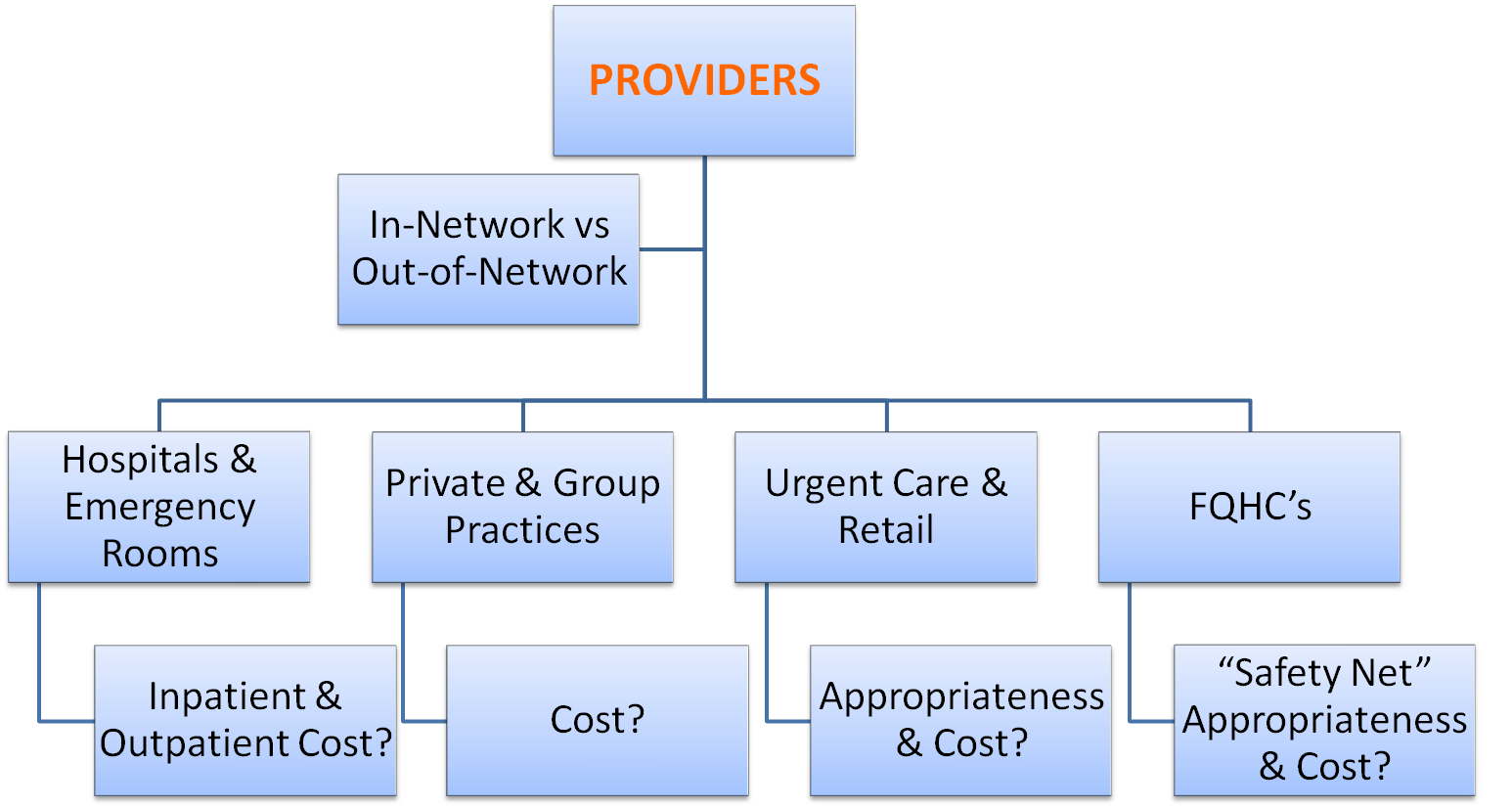Promoting education and transparency for healthcare consumers
HEALTHCARE PROVIDERS

Our definition of healthcare providers includes individual physicians and practitioners as well as healthcare entities such as private and group practices, hospitals, emergency rooms, urgent care centers, ambulatory surgery centers, and federally qualified health centers, among others. Each type of provider serves a vital role given a patient's particular need, and it's easy to assume that all providers are the same (a doctor visit is a doctor visit, right?). In reality, there are many classifications of providers in terms of Medicare designation and cost. Understanding each can help tremendously in informed decision making and cost-saving. We'll examine some common providers here and suggest some ways to research and compare costs between providers.
There are a couple important notes that we'd like to emphasize here that tie into information contained throughout Healthcare Whiz. In this section, whenever we discuss prices or costs of services, we assume that we're comparing healthcare provider options that are all in-network with your particular health insurance plan. This allows us to compare apples to apples. Costs can vary greatly when you seek care outside of your plan's provider network, so we always recommend seeking care that is in-network as opposed to out-of-network whenever possible. Also, most private insurers base their reimbursement rates in large part on Medicare rates, so when we talk about Medicare cost savings, this will generally translate to private insurance cost-savings as well. If you happen to be uninsured, shopping around for the most affordable care becomes even more important, and the cost discussions here should generally apply to providers' uninsured or self-pay prices also.
Physicians & Other Individual Practitioners
Physicians are licensed healthcare providers that are legally entitled to deliver medical care. In most cases, physicians are required to be licensed in each state in which they practice.
Learn morePrivate & Group Practices
Private practice normally refers to a single, self-employed physician practice. Group Practice generally refers to a practice that is owned and operated by a group of physicians. Private and group practices are commonly referred to as clinics.
Learn moreHospitals
Hospitals are healthcare facilities that provide medical care for a wide-range of injuries and illnesses utilizing diverse and specialized staff and equipment. Hospitals serve a vital role in healthcare as they are the primary medical care facilites for emergency care and treatment of serious health conditions.
Learn moreEmergency Rooms
Emergency rooms (ER's), also known as emergency departments, are medical care facilities that specialize in emergency medical treatment for patients who arrive without a prior appointment and those who arrive via ambulance. ER's are commonly found in hospitals, but free-standing emergency rooms also exist.
Learn moreUrgent Care and Retail Centers
Urgent Care centers are outpatient walk-in clinics that specialize in treatment of illnesses or injuries that require immediate attention but are generally not serious enough to require an emergency room visit. Retail clinics, also known as convenient care clinics, refer to walk-in practices located in retail stores, supermarkets, and pharmacies.
Learn moreFederally Qualified Health Centers (FQHC's)
Federally Qualified Health Centers (FQHC's) are government subsidized healthcare facilities that offer primary care and other medical services to underserved urban and rural communities. FQHC's are a vital component of what is referred to as the healthcare "safety-net".
Learn moreAmbulatory Surgery Centers (ASC's)
ASC's are outpatient centers that provide same-day surgery procedures that do not require an overnight hospital stay. ASC's can be a cost-effective option for low risk, outpatient surgical care.
Learn moreOther Provider Types
In addition to the providers discussed in detail in this section, the Centers for Medicare and Medicaid Services (CMS) also recognizes these provider types: home health, hospice, skilled nursing facilities (SNF), critical access hospitals, durable medical equipment (DME), rural health clinics, pharmacists, ambulance, anesthesiologists, and clinical labs.
Learn moreProvider Resources
Links and other resources to refer to for more information on healthcare providers.
Learn more